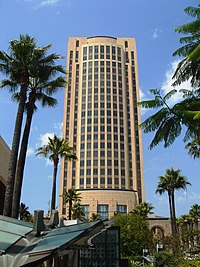MTA Building
| MTA Building | |
|---|---|
 |
|
| General information | |
| Status | Complete |
| Type | Commercial office |
| Location | One Gateway Plaza, Los Angeles |
| Coordinates | 34°3′23.2″N 118°13′58.6″W / 34.056444°N 118.232944°WCoordinates: 34°3′23.2″N 118°13′58.6″W / 34.056444°N 118.232944°W |
| Completed | 1995 |
| Cost | $300 million |
| Height | |
| Roof | 398 ft (121 m) |
| Technical details | |
| Floor count | 25 |
| Floor area | 650,000 sq ft (60,000 m2) |
| Design and construction | |
| Architect | McLarand Vasquez Emsiek & Partners |
| Main contractor | Charles Pankow Builders, Ltd. |
The MTA Building is a 398 ft (121 m) high rise office tower in Los Angeles, California. It is located in Northeastern Downtown Los Angeles, east across the tracks from Union Station.
Completed in 1995, it serves as the main headquarters for the Los Angeles County Metropolitan Transportation Authority as well as the Southern California Regional Rail Authority.
The $300 million building is the main fixture of the Patsaouras Transit Plaza and features exquisite artwork throughout the exterior facades and the interior lobby. The building's design features a blend of contextual influences of 1930's Hispanic-Deco and post-modern architecture. It features four levels of underground parking.
In the Star Trek: Voyager episode "Future's End", a digitally-altered image of the building was used to represent the 1996 headquarters of villain Henry Starling (Ed Begley, Jr.). The building was again seen, this time on a matte painting depicting a building on the Mari homeworld in the Star Trek: Voyager episode "Random Thoughts" in 1997.
Prior to its completion, the building was criticized for its use of expensive construction materials as a public agency. One critic dubbed it as a "Taj Mahal" in reference to its Italian granite, English brick and a $300,000 aquarium. However, proponents of the project argued that it will revive a forgotten but historically important part of Downtown and create a new public place for a city with many communities but few communal gathering places.
Officials contend that the MTA-owned headquarters will save money by bringing together over 2,000 workers scattered around town at leased quarters. Once the bonds are paid off in 30 years, the MTA will own its own headquarters and can divert the money previously spent on rent for public transit, they say.
Officials say the new building — built under budget and on time also will help put an end to the rivalries between staffs of the old transit agencies by bringing them together under the same roof.
...
Wikipedia
